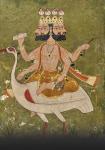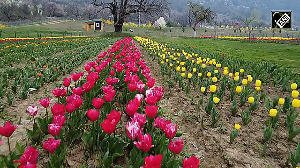 'We understand India needs to come across as very hospitable to its all-powerful visitor. But must she do that by alienating her own people?'
'We understand India needs to come across as very hospitable to its all-powerful visitor. But must she do that by alienating her own people?'
'Would not proudly showing President Xi Jinping that people from India's North-East are as much a part of India as those from anywhere else be like a slap on the face of Chinese aggression?' asks Chitra Ahanthem.
Even Vaastu Shastra says the north-eastern part of a house should be given maximum care; India will prosper only when the North-East will.
Since the North-East region falls off the Indian media radar for the most part, it might have missed out on this gem of a line from Prime Minister Narendra Modi when he was on the election trail, campaigning for what would become a historic mandate.
Addressing a rally in Imphal, the capital of Manipur, the then prime ministerial candidate had waxed eloquent about the region thus.
But developments in the honourable prime minister's home state clearly show that people from the North-East should just disappear when India's powerful neighbour comes calling.
Not many national media outlets carried the news of the Gujarat police asking the management of the hotel where visiting Chinese President Xi Jinping is staying to keep its staff from the North-East away from its premises.
But the Delhi supplement of a newspaper did carry the news. It quoted police sources as saying that they did not want anything or anybody to 'make a bad impression on Xi Jinping,' and hence all staff from the North-East states -- and those from Tibet -- had been asked to stay away.
In these days of hashtag activism and social media overdrive, such news never stays buried. And it didn't. The usual outrage followed, and even now on my social media feeds quips continue.
'Who wants to be an Indian? Modi does not need to show me the door...I walk out,' reads a tweet on my timeline.
'We're not Chinese, we're not Tibetans and we're definitely not Indians. So what do we call ourselves? #RacismRiddle,' says another.
It really reflects a sad fact -- that the government machineries are yet to come to grips with India's own citizens who belong to a certain racial profile.
In 2012, a similar situation played out in New Delhi when the then Chinese president came to attend the 4th BRICS summit. Following an order passed by the Foreigner Regional Registration Offices under the Foreigners' Act to detain Tibetans who did not have genuine identity proof in the lead to the summit, the Delhi police ended up detaining and harassing people from the North-East.
Things came to such a pass that the Delhi high court sent out a directive to the Delhi police not to harass people from the North-East and Ladakh because of their facial similarity with Tibetans.
Even as people from the North-East fume and rage over measures that show the government's ignorance of the diversity that this country is so extolled for, the Tibetan community has not been deterred from making its point.
In 2012, a Tibetan activist immolated himself. Today, the Tibetan flag has been unfurled. It clearly indicates that the lockdown on the Tibetan community -- and by default people from the North-East and Ladakh -- is not amounting to much.
What is worrying here is that the everyday racism people from the North-East face at the hands of their own countrymen is being given official sanction.
What is even more worrying is that the anger and sarcasm on social media is being met with responses about how people from the North-East deserve to be put in place.
Hate begets hate, alienation begets alienation. And unless this vicious cycle is broken, the divide between 'mainland India' and the Seven Sisters will remain unbridgeable.
It is not just enough to make the 'Chinki' abuse punishable by law. India must stand up for its famed diversity. And it has to start with the government.
Yes, we understand India needs to come across as very hospitable to its all-powerful visitor. But must she do that by alienating her own people? In fact, would not proudly showing President Xi that people from India's North-East are as much a part of India as those from anywhere else be like a slap on the face of Chinese aggression?
Even when Bollywood, India's national obsession, finally turns its gaze towards us North-Easterners, it can't find an actress to play Mary Kom. It must be Priyanka Chopra -- pretty as she is, no doubt -- who must don prosthetics to play the boxer who has done her country proud.
Following the death of Nido Tania, a student from Arunachal Pradesh, in New Delhi in what has been described as a racial attack, an 11-member panel headed by M P Bezbaruah in its 80-page report to the Union home ministry had called for various measures. These included 'serious legal reform by changing the IPC to make racial discrimination an offence and introducing special police units and fast track courts for trying hate crimes' to introduce certain aspects of the 'North-East ethos' into the curriculum to 'integrate each aspect of the region into the consciousness of the people outside' and to use the resources of the information and broadcasting ministry to create awareness about the North-East region and its people.
The irony here is that the report talked of the government taking steps to rein in people from discriminating against people from the North-East. What we have now is the government itself taking the lead in shunning its own people, only because they look different -- and unfortunately similar to people from a powerful nation that may or may not have drawn battle-lines at the Ladakh border.
Image: The police detain Tibetan activists protesting against Chinese President Xi Jinping's visit to India outside the Chinese embassy in New Delhi on Wednesday, September 17. Photograph: Kamal Singh, PTI Photo.
Chitra Ahanthem is a mother and a journalist based in Manipur.










 © 2025
© 2025